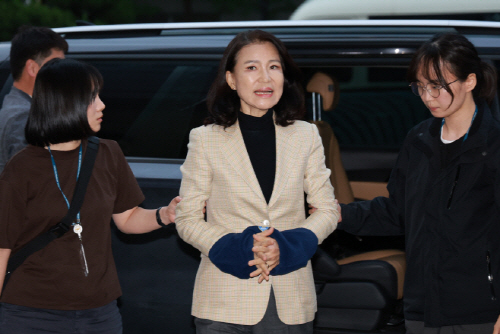 |
| Lee Jin-sook, former chair of the Korea Communications Commission, is escorted to Yeongdeungpo Police Station in Seoul on Nov. 2 on charges including violations of the National Public Service Act and the Public Official Election Act. / Source: Yonhap News |
More than 40 days after they were launched, the new broadcasting and media regulators remain leaderless and stuck in neutral. Even with the transition from the old Korea Communications Commission (KCC), there is still no mechanism to guarantee neutrality or a functioning quorum. Critics say the much-touted “normalization of the KCC” has amounted to little more than the ouster of former KCC chair Lee Jin-sook.
The Broadcast and Media Communications Commission (BMCC) has yet to take a single step forward more than a month after its launch. The Broadcast and Media Communications Review Committee (BMCRC), which was created alongside it, has also ground to a halt, leaving victims of sexual exploitation and other abuses effectively neglected. Since the abolition of the KCC, the government has failed to put in place meaningful follow-up measures, paralyzing core functions and fueling criticism that the overhaul did nothing more than remove Lee Jin-sook.
Although more than 40 days have passed since the BMCC and BMCRC were formally established on Oct. 1, there has been no substantive discussion about appointing or nominating their chairs and other members. At the center of the deadlock is the National Assembly, which holds the power to recommend members and remains locked in a stalemate over what opponents call “rushed legislation.”
Under the BMCC Act, some functions of the Ministry of Science and ICT are transferred to the new body, and the number of commissioners is increased from five to seven. But the law does not address the key problems that dogged the KCC: political bias and prolonged vacancies that kept the commission below quorum. In effect, the government simply reshuffled and expanded parts of the old structure. The ruling People Power Party has demanded a “full reset” of the law and is refusing to recommend members for seats allocated to the opposition camp on the BMCC.
The absence of a functioning commission has triggered a chain reaction of policy gridlock. Amendments to the three broadcasting laws require the three public broadcasters to form new boards of directors by Dec. 9. Without BMCC regulations in place to govern those boards, public broadcasters are expected to remain “empty houses” into next year. The BMCRC also cannot properly deliberate on illegal content such as sexual exploitation videos or fraudulent recruitment ads that lure jobseekers to Cambodia. For now, it can only issue non-binding “self-regulation” recommendations, leaving public safety at risk as the government and ruling party merely swap out signboards without real solutions.
Observers say the problems that plagued the KCC are being replicated at the BMCC. In June last year, when it was still in opposition, the Democratic Party refused to recommend replacements after some KCC commissioners’ terms expired. As a result, the commission operated with only two members from the then-ruling camp, prompting accusations of bias and “unlawful resolutions.” Its work largely ground to a halt. With the vacuum now extended under the new bodies, critics argue that the Democratic Party’s original slogan of “normalizing the KCC” has been emptied of meaning. One political source quipped, “In the end, the BMCC’s role seems to have ended with ‘purging Lee Jin-sook’ and not much else.”
Most Read
-
1
-
2
-
3
-
4
-
5
-
6
-
7





















